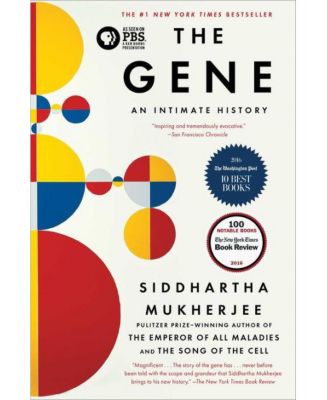The Gene- An Intimate History by Siddhartha Mukherjee
Product Details
Web ID: 4357949What histories of science/medicine should be
Genetics is a field of biomedical research that is both in motion and influential over our daily lives. It promises to help millions afflicted with horrific disease, yet it could be poised to change (or unravel?) human life as we seek to write our own destinies in DNA. Real action in this field has only occurred in the last 200 years, starting with Gregor Mendel and accelerating in the early twentieth century. Mukherjee, an oncologist (cancer doctor) with ample writing talents, authors this field’s history in engaging fashion. Importantly, he carefully deals not just with the science but with the human bioethical concerns. Throughout my adult life, I’ve been aware of the history of genetics and have picked up this or that along the way. Thus, I have heard of most of the broad outline that Mukherjee has to offer. However, in each stage of this story, he contributes nuanced nuggets that shape the story, nuggets new to me. His writing talents about the history of medicine and science are well-acknowledged as he has won a Pulitzer Prize for his 2010 history of cancer. He simply extends that formidable skill into describing one of the most happening fields in contemporary research. Because of his excellence in writing and research, I don’t have much to offer in terms of critique. His ethical perspectives are well-balanced and circumspect (even though this is not primarily a bioethical text). He even provides personal stories of his family which bring underlying passions to life. He touches all the bases of a good scientific history to maximize impact while maintaining a detached approach to matters of opinion. Therefore, it’s no surprise that it has won numerous, prestigious awards (though, lamentably, not another Pulitzer). Obviously, professionals in fields directly touched by genetics can benefit most from reading this: geneticists, historians of science, oncologists, and microbiologists. But this book’s horizons certainly extend to the general public. Investors, cultural critics, influencers, and fans of science (among many others) can all get a scoop on how history is unfolding or a primer about a hot but difficult cultural topic. Students – whether aspiring scientists in high school or college students seeking sophistication – are obvious target audiences. Overall, this provides an excellent treatment for anyone interested in whether and how we can write human destiny, either through small cures or possibly stunningly large, potentially scary rewrites.
Recommends this product

Customer review from barnesandnoble.com

